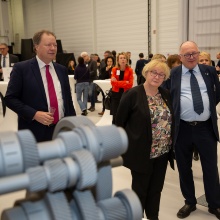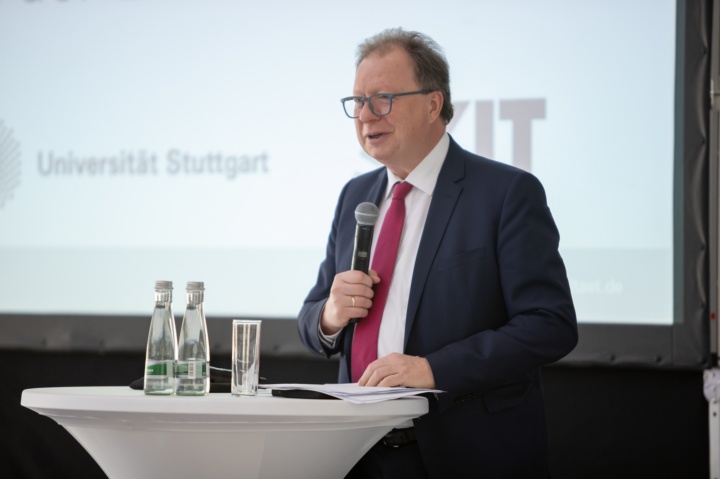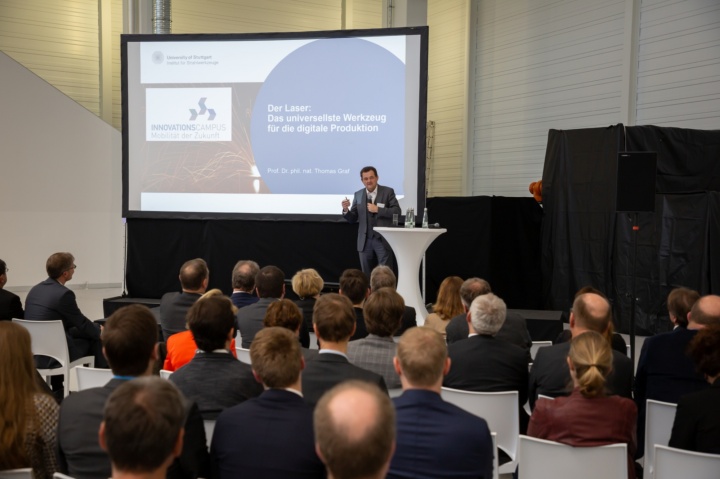Safe and sustainable mobility is one of the big issues of society, ranging from urban commutes to merchant shipping on oceans. To make mobility sustainable in times of urbanization, resource scarcity, and climate change, the University of Stuttgart and Karlsruhe Institute of Technology (KIT) pool their research competencies in the Innovation Campus “Future Mobility” (ICM) that is funded by the State of Baden-Württemberg with around 10 million euros. Today in Stuttgart, work is started officially in the presence of State Science Minister Theresia Bauer.
It is the goal of the ICM to create new, pioneering technologies in the areas of mobility and production. The first two pilot projects, hence, will cover zero-emission drives and additive manufacture, i.e. use of 3D printers not only for high-quality and operational (lightweight) components, but also for components with novel functions. KIT and the University of Stuttgart pool their competencies to think about new forms of mobility, flexible production technologies, and future value networks and study them interdisciplinarily. The ICM addresses the transformation process in the mobility sector. Excellent fundamental research and new innovation processes will give rise to disruptive technologies and innovation leaps in the areas of “Additive Manufacture” and “Zero-emission Drives.”
“It is our declared objective in Baden-Württemberg to become the showcase of modern and sustainable mobility,” says Science Minister Theresia Bauer. “We need science to think beyond current industrial application horizons of technologies. The Innovation Campus is a major element to develop key technologies for climate-friendly mobility. Excellent research will open up new perspectives of creating added value in automotive industry.”
The Rector of the University of Stuttgart, Professor Wolfram Ressel, emphasizes: “The Innovation Campus “Future Mobility” is in line with the vision of ‘intelligent systems for a sustainable society’ of the University of Stuttgart. Together with the KIT, we will conduct interdisciplinary cutting-edge research for smart mobility solutions on our joint technology platform. Among others, we will use a flexible ‘universal machine’ that integrates separate serial fabrication processes in a single technology.”
“Future mobility represents a major challenge for society and is associated with many expectations: It is to be comfortable, safe, and inexpensive, interconnected, sustainable, accessible and quick, autonomous, and robust,” summarizes the President of KIT, Professor Holger Hanselka. “KIT and the University of Stuttgart will now work on concepts and technologies for future vehicles and the necessary production systems to respond to this challenge.”
“We are presently witnessing the change of traditional automotive and supplier industries to providers of sustainable mobility services,” says KIT Vice-President for Innovation and International Affairs, Professor Thomas Hirth. “With the ICM, we want to accompany and lead this change. For this, we will rely on scientific excellence, interdisciplinary fundamental research, and new innovation processes in production and vehicle technologies.”
“KIT and the University of Stuttgart will enter the first phase of the ICM with the focus on “Additive Manufacture” and “Zero-emission Drives,” adds Professor Peter Middendorf, Vice Rector for Knowledge and Technology Transfer of the University of Stuttgart. “This will give rise to major synergy effects for both partners, which will be further advanced.”
Phase One: Additive Manufacture and Zero-emission Drives
The ICM will enter the first phase by focusing on “Additive Manufacture” and “Zero-emission Drives.” Work will concentrate on the vision of decentralized production based on an entirely flexible production technology – the universal machine. Fabrication data only will be transmitted digitally, whereas products can be produced locally and, if necessary, in the short term, with a high quality, inexpensively, and in any small numbers instead of storing them at large facilities and distributing them via complex logistic chains causing traffic. However, this will require a technology leap in fabrication technology.
On the other hand, new production technologies can help reduce emissions of drive systems and vehicles, as they help save weight, space, material, and energy or combine functions of various components. For this reason, the ICM will also develop concepts for smaller vehicles and the corresponding components that are specially tailored to the “First & Last Mile” mobility requirements. This means that work will concentrate on need-tailored interconnection of individual and public transport systems. By means of prototypes, such as safe, smart, comfortable commuter mobiles for short distances, the concepts of the first phase will be validated and demonstrated. Zero-emission vehicles and mobility concepts using digitalization will lead to more efficiency in the use of resources and transport space. Focuses in the next phases will be identified together with the scientists involved and external experts within the framework of a think tank.
The Innovation Campus ‘Future Mobility’ is a joint initiative of KIT and the University of Stuttgart to enable groundbreaking ideas and innovations. For this, a competitive, transparent process will be used for project selection and entirely new approaches of “fail fast and often” will be pursued quickly and flexibly. Temporary use of approaches that may turn out to be a failure later on will be possible, i.e. learning from mistakes. The ICM will identify industrial fields that will be important in future, create cooperation places as well as innovation and founding culture, promote young talents, and integrate research in Baden-Württemberg.
At the “Innovation Campus ‘Future Mobility’ – Research for Future Sustainable Mobility,” researchers from Karlsruhe and Stuttgart working in the areas of vehicle technology, product development, production technology, chemistry, materials, electrical engineering, aircraft construction, and machine tools will collaborate. In addition, projects of other universities and research institutions in Baden-Württemberg may be integrated depending on the topic. The Baden-Württemberg Ministry for Science, Research, and the Arts funds the ICM with EUR 10 million over five years. In addition, young investigators groups will be set up and professorships for “Laser Systems Technology” and “Digitalization of the Development of Materials and Processes for Additive Manufacture” will be funded at the University of Stuttgart and KIT, respectively, for a duration of ten years.
About the University of Stuttgart
The University of Stuttgart, established in 1829, has about 26,000 students. Its vision “Intelligent Systems for a Sustainable Society” and its profile “The Stuttgart Way” stand for a consistent interdisciplinary integration of engineering, natural sciences, humanities, and social sciences. Its outstanding role as a worldwide connected research university is reflected, among others, by the two Clusters of Excellence “Data-integrated Simulation Sciences” and “Integrative Computational Design and Construction for Architecture,” the ARENA 2036 Research Campus, participation in the “Cyber Valley” network, as well as by a number of collaborative research centers and research training groups.
Being “The Research University in the Helmholtz Association”, KIT creates and imparts knowledge for the society and the environment. It is the objective to make significant contributions to the global challenges in the fields of energy, mobility, and information. For this, about 9,300 employees cooperate in a broad range of disciplines in natural sciences, engineering sciences, economics, and the humanities and social sciences. KIT prepares its 24,400 students for responsible tasks in society, industry, and science by offering research-based study programs. Innovation efforts at KIT build a bridge between important scientific findings and their application for the benefit of society, economic prosperity, and the preservation of our natural basis of life.




